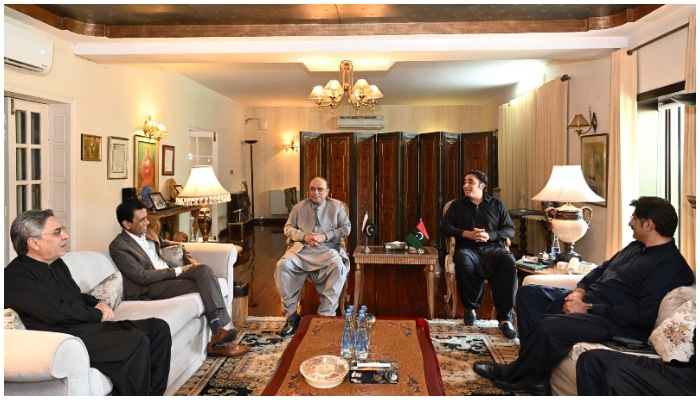PPP-MQM-P: An uneasy truce
Despite govt's willingness to give ministries to MQM-P, party decides to support Opposition keeping eye on future political scenarios
March 30, 2022

As Sindh Governor Imran Ismail returned to Governor House on Tuesday night, after meeting with the Muttahida Qaumi Movement-Pakistan leadership, he reportedly informed Prime Minister Imran Khan: “They [MQM-P] are no longer with us.”
In many ways meaning, the game is over for the ruling Pakistan Tehreek-e-Insaf (PTI) and the cricket-legend-turned-politician Imran Khan.
For now, it seems that the prime minister, who for all practical purposes has lost the majority of the national assembly, will now build an anti-West narrative for the next election and blame them for dislodging his government.
The last offer the government made to the MQM-P was one or two more federal ministries, including the ministry for ports and shipping, as per those privy to developments. The government was also ready to hand over the slot of governor Sindh to the political party.
Yet, the MQM-P decided to support the opposition keeping an eye on future political scenarios and urban politics.
The pact, between the MQM-P and opposition, may be the toughest of all previous such agreements. In 1988, the much-stronger MQM signed an a pact with the Pakistan People’s Party (PPP) and one in 1990 with the Pakistan Muslim League-N (PML-N) and with General Musharraf in 2002.
It inked its most recent written agreement in 2018 with the PTI, in the post-August 22, 2016 scenario.
Interestingly, in 1989, even though they had an accord with the PPP, the MQM still voted against former Prime Minister Benazir Bhutto. They did this as they were pushed by the then powerful establishment headed by retired General Aslam Beg and the late President Ghulam Ishaq Khan. But the motion was defeated, which later caused a lot of problems for the MQM.
Back to today. The million dollar question is that why has the MQM-P decided to part ways with PTI? More importantly, why has it signed an accord with the PPP at this stage, particularly when they have enjoyed smooth relationships with the PTI and in the last three years some of their demands were also met.
Also, why did they take the risk of re-joining the PPP, despite the ‘love and hate’ relationship between the two?
The present accord with the PPP is somewhat different from the past as the guarantors are the combined opposition, which has also signed on the dotted line. These guaranteer include Shehbaz Sharif, Maulana Fazlur Rehman and Akhtar Mengal, beside former president Asif Ali Zardari and PPP chairman Bilawal Bhutto Zardari.
What will the MQM-P gain from this agreement?
While details will be shared by the evening, sources reveal that the agreement includes immediate appointment of new political administrators in Karachi, Hyderabad and Mirpur Khas. Other key points of the contract include amendments in the Sindh Local Government Act 2021, a mechanism on a 60-40 job quota between rural and urban Sindh, the provincial finance commission, census and delimitation of constituencies.
As far as the allocation of ministries is concerned, the MQM-P sources say nothing of this sort has either been demanded by them or written in the accord. However, PPP sources say that the MQM-P would be offered at least four to five ministries in Sindh.
The PPP sources also believe that the chances of success of the present accord are far brighter than those of the past for the simple reasons that this is a new MQM, with whom they have no serious differences.
Now why would the MQM-P go against the PTI? Quite simply because the MQM-P intends to contest the next general election as PTI’s rival and not as a partner as they still believed that at least eight to nine of their confirmed seats were given to PTI in 2018, by those who matter.
Will this accord help revive MQM-P’s electoral politics?
It might not be that easy as there are now many different factions within the MQM and groups like Pak Sarzameen Party, MQM (Workers), MQM (Haqiqi) and more important MQM (London) so their votes could get divided.
Secondly, how Prime Minister Imran Khan reacts to this decision by the MQM-P and what kind of narrative he builds against them is a tough question to answer.











